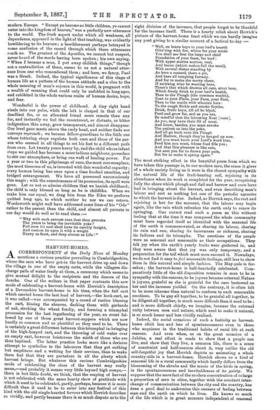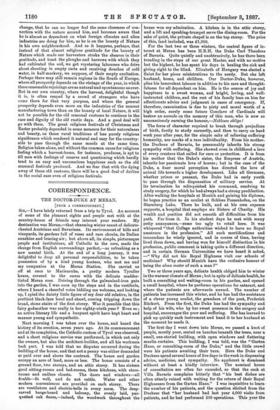HARVEST-HOMES.
A CORRESPONDENT of the Daily News of Monday -.6111- mentions a curious practice prevailing in Cambridgeshire, where the men who have got-in the harvest drive up and down the village in one of the empty carts, while the villagers dis- charge pails of water freely at them, a ceremony which seems to give mutual delight to the recipients and the donors of the douche. One of the writers in that paper contrasts this new mode of celebrating a harvest-home with Herrick's description of a Devonshire harvest-home in his time, when the full cart which carried home the last load of harvest,—the hock-cart, as it was called—was accompanied by a crowd of rustics blessing the cart, kissing the sheaves, decking them with garlands of oak, stroking the wheat fondly, and forming a triumphal procession for the last ingathering of the year, an event fol- lowed by one of those great harvest-suppers which are now hardly so common and so plentiful as they used to be. There is certainly a great difference between this triumphal in-bringing of the high-heaped cart, and the throwing of cold water over an empty cart, however boisterous the mirth of those who are thus baptised. The latter practice looks more like a derisive attempt to symbolise to the labourers that they get nothing but emptiness and a wetting for their services, than to make them feel that they are partakers in all the plenty which harvest brings. But whatever this curious Cambridgeshire mode of celebrating the close of the harvest may really mean,—and probably it means very little beyond high romps,— there is but little doubt, we think, that the reaping of harvest is not celebrated with the same hearty show of gratitude with which it used to be celebrated, partly, perhaps, because it is more difficult than it need to be to enter into any festival of this kind with the old single-hearted fervour which Herrick describes so vividly, and partly because there is so much dispute as to the
right division of the increase, that people forget to be thankful for the increase itself. There is a hearty relish about Herrick's picture of the harvest-home feast which we can hardly imagine any poet giving to a similar account of a festival to.day
"Well, on brave boys to your lord's hearth
Glitt'ring with fire, where for your mirth You shall see first the large and chief Foundation of your feast, fat beef, With upper stories mutton, veal, And bacon (which makes fall the meal), With several dishes standing by As here a custard, there a pie, And here all tempting furmity.
And for to make the merry cheer, If smirking wine be wanting here, There's that which drowns all care, stout beor, Which freely drink to your lord's health, Then to the Plough (the common wealth), Next to your Flails, your Pane, your Fats, Then to the maids with wheaten hats To the rough Sickle and crookt Scythe, Drink, frolio boys, till all be blyth.
Feed and grow fat, and as you eat,
Be mindful that the labouring Neat [oxen], As you, may have their fill of meat.
And know, besides, you must revoke The patient or into the yoke, And all go back unto the Plough And Harrow, though they're barged up now. And you must know your Lord's word true, Feed him you must, whose food fills you; And that this pleasure is like rain, Not sent you for to drown your pain, Bat for to make it spring again."
The most striking effect in the beautiful poem from which we have taken this passage is, to our modern ears, the sense it gives of a whole society living as it were in the closest sympathy with the natural life of the fruit-bearing soil, rejoicing in its abundance when its work is completed for the year, recognising fully the share which plough and flail and harrow and oxen have had in bringing about the harvest, and even describing man's labour and rest as nothing but one of the periodic agencies to which the harvest is due. Indeed, as Herrick says, the rest and rejoicing is but for the moment, that the labour may begin again, like the rain which refreshes the earth only to renew its springing. One cannot read such a poem as this without feeling that at the time it was composed the whole community must have regarded itself as identified with the seasonal life of the earth it commemorated, as sharing its labour, sharing its rain and sun, sharing its barrenness or richness, sharing its failures and its triumphs. The emotions of the people were as seasonal and seasonable as their occupations. They felt joy when the earth's yearly fruits were gathered in, and they were aware that that joy was only temporary, and a preparation for the toil which must soon succeed it. Nowadays, we do not find it easy to feel seasonable feelings, still less to show them in this natural and simple fashion. The May-pole is for- saken; the harvest-home is half-heartedly celebrated. Com- paratively little of the old disposition remains in man to be in sympathy with the seasons, to be joyous because external Nature is joyous, grateful as she is grateful for the care bestowed on her and the increase yielded. On the contrary, it is often felt to be more irksome than natural to conform to such seasonable emotions. To be gay all together, to be grateful all together, to be diligent all together, is much more difficult than it used to be ; and is more difficult chiefly, we imagine, because the external unity between men and nature, which used to make it natural, is no much looser and less vividly realised.
Indeed, the social occasions of such a festivity as harvest. home elicit less and less of spontaneousness even in those who acquiesce in the traditional habits of rural life at such seasons. And even when, as on the great occasion of a Jubilee, a real effort is made to show that a people can live, and show that they live, a COMIllon life, there is a sense of constraint and half-success about it, very unlike the old self-forgetful joy that Herrick depicts as animating a whole country-aide in a harvest-home. Herrick shows Es a kind of seasonal life in a rural community which hardly differs from the blossoming of the shrubs and the music of the birds in spring, in the spontaneousness and inevitableness of its gaiety. We suppose that the mere fact of the modern concentration of so large a proportion of men in cities, together with the constant inter. change of communication between the city and the country, ham done a good deal to undermine this oneness of feeling between man and the earth on which he lives. He knows so much of the life which in in great measure independent of seasonal
change, that he can no longer feel the same closeness of con- nection with the nature around him, and becomes aware that he is almost as dependent on what foreign climates and alien industries are doing for him, as he is on the bounty of Nature in his own neighbourhood. And so it happens, perhaps, that instead of that almost religions gratitude for the bounty of Nature which made our harvesters stroke the sheaves in their gratitude, and toast the ploughs and harrows with which they had cultivated the soil, we get roystering labourers who drive about shouting in empty carte and receiving douches of cold water, in half-mockery, we suppose, of their empty exaltation. Perhaps there may still remain regions in the South of Europe, where all prosperity depends on the vintage of the year, in which these seasonable rejoicings are as natural and spontaneous as ever. Butin our own country, where the harvest, delightful though it is, is often reaped by a crowd of strangers who have come there for that very purpose, and where the general prosperity depends even more on the industries of the nearest manufacturing town than on the bounty of local Nature, it will not be possible for the old seasonal customs to continue in the ease and dignity of the old rustic days. And a good deal will go with them. The great religious festivals of Christmas and Easter probably depended in some measure for their naturalness and beauty, on those rural traditions of less purely religions significance which rendered it natural and easy for the country. aide to pass through the same moods at the same time. Religion taken alone, and without the common cause for religious feeling which a harvest-home, for instance, produces, is apt to fill men with feelings of reserve and questioning which hardly tend to an easy and unconscious happiness such as the old seasonal festivals produced. And we fear that with the dying away of these old customs, there will be a good deal of decline in the social ease even of religions festivals.



































 Previous page
Previous page